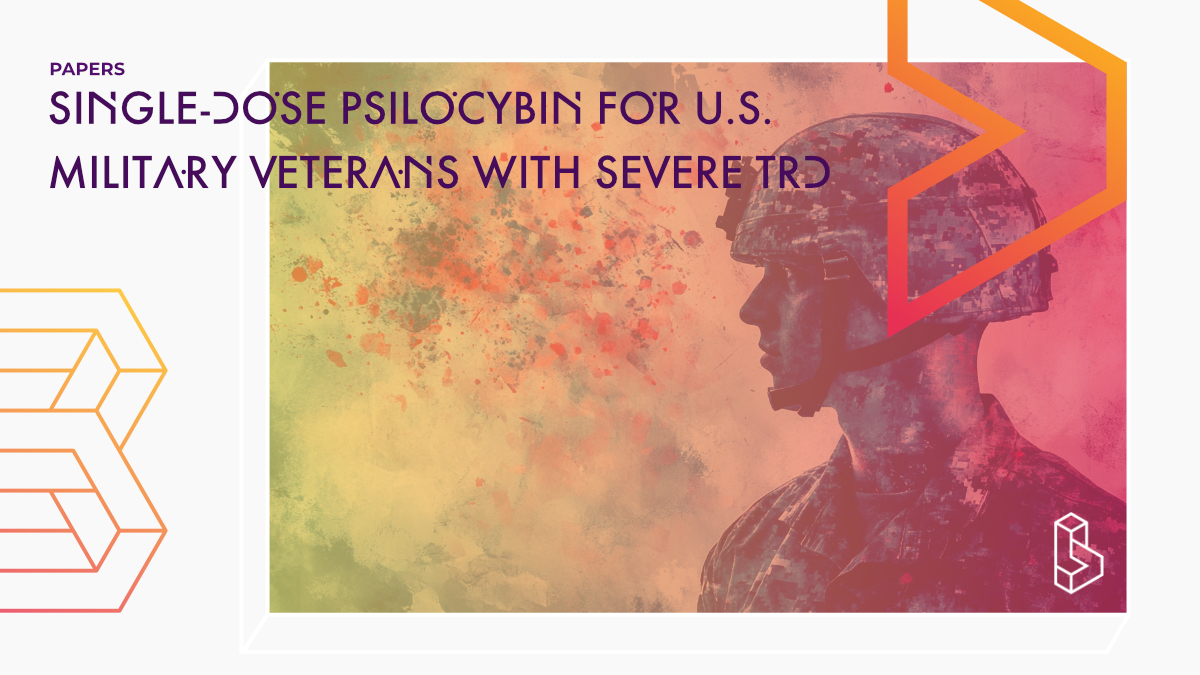This open-label trial (n=15) evaluates the efficacy and safety of psilocybin (25mg) in veterans with severe treatment-resistant depression (TRD). It finds that 60% of participants met response criteria and 53% met remission criteria at 3 weeks post-treatment, with 47% maintaining response and 40% maintaining remission at 12 weeks.
Abstract of Single-dose psilocybin for U.S. military Veterans with severe treatment-resistant depression
“Background The enduring and severe depression often suffered by Veterans causes immense suffering and is associated with high rates of suicide and disability. This is the first study to evaluate the efficacy and safety of psilocybin in Veterans with severe treatment-resistant depression (TRD).
Methods 15 Veterans with severe TRD (major depressive episode failing to respond to ≥5 treatments, or lasting >2 years) received 25 mg of psilocybin. Primary outcome was change in Montgomery-Åsberg Depression Rating scale (MADRS) at 3 weeks posttreatment. Response was defined s ≥ 50 % reduction in MADRS, and remission as ≤10 MADRS score. Psychedelic experience was assessed using the Five-Dimensional Altered States of Consciousness scale (5D-ASC). Safety measures included assessment of suicidality and adverse events. Participants on antidepressants were tapered to avoid drug interactions.
Results Of 15 participants, 60 % met response and 53 % met remission criteria at Week 3. At 12 weeks, 47 % maintained response, and 40 % remission. Co-morbid PTSD did not significantly influence study outcomes. The psychedelic experience reported in 5D-ASC did not correlate with response. Participants judged to need antidepressants were restarted and considered non-responders from that timepoint (n = 4). No unexpected adverse events occurred.
Limitations Limitations include the small sample size, and the uncontrolled and unblinded nature of the study.
Conclusions In this first study on psilocybin for Veterans with severe TRD, a surprising response and remission was seen. Many Veterans had PTSD though no moderating impact of response was observed. The degree of psychedelic experience did not correlate with depression changes. Further study is warranted.“
Authors: Sara Ellis, Catherine Bostian, Wendy Feng, Eileen Fischer, Garrett Schwartz, Katherine Eisen, Melanie Lean, Elizabeth Conlan, Michael Ostacher, Scott Aaronson & Trisha Suppes
Summary of Single-dose psilocybin for U.S. military Veterans with severe treatment-resistant depression
Major Depressive Disorder (MDD) is a leading cause of disability worldwide, with significant economic impacts and high suicide rates. Veterans, particularly those in the U.S. military, are disproportionately affected by MDD due to unique risk factors like combat exposure, trauma, and toxic exposures. The prevalence of depression among Veterans is around 13.5%, higher than the general U.S. population’s 9.2%. Veterans also often experience other mental health conditions such as PTSD, substance use disorders, and chronic pain, all of which compound the burden of MDD. Furthermore, among Veterans with depression, about 33.2% also suffer from PTSD, a rate three times higher than the general population.
Despite the availability of various treatments for MDD, a substantial number of patients do not achieve remission, even after multiple treatment attempts. This condition is termed treatment-resistant depression (TRD), where depression remains after at least two different antidepressant treatments. TRD is especially common in Veterans, affecting 11–14% of those with MDD, and is associated with higher healthcare costs, substance abuse, anxiety, suicidal thoughts, and chronic pain. Given the limited success of conventional treatments for TRD, there is increasing interest in alternative pharmacological options, including psychedelics like psilocybin and ketamine, which show promise for their rapid-acting antidepressant effects.
Psilocybin, a psychoactive compound found in certain mushrooms, has been used in traditional healing practices for centuries. It acts on serotonin receptors in the brain, particularly the 5-HT2A receptor. Over recent years, psilocybin-assisted therapy has gained attention as a potential treatment for various psychiatric conditions, including depression, addiction, and end-of-life anxiety. Several preliminary studies in non-Veteran populations have suggested that psilocybin may be effective for treating depression and TRD, with some trials showing notable response and remission rates. These early studies typically used open-label designs, where participants and researchers knew what treatment was being given, but they laid the groundwork for larger, more rigorous trials.
Find this paper
https://doi.org/10.1016/j.jad.2024.09.133
Paywall | Google Scholar | Backup | 🕊
Cite this paper (APA)
Ellis, S., Bostian, C., Feng, W., Fischer, E., Schwartz, G., Eisen, K., ... & Suppes, T. (2024). Single-dose psilocybin for US military Veterans with severe treatment-resistant depression–A first-in-kind open-label pilot study. Journal of Affective Disorders.
Study details
Compounds studied
Psilocybin
Topics studied
Depression
Treatment-Resistant Depression
Study characteristics
Original
Open-Label
Participants
15
Humans
Compound Details
The psychedelics given at which dose and how many times
Psilocybin 25 mg | 1xLinked Research Papers
Notable research papers that build on or are influenced by this paper
Long-term outcomes of single-dose psilocybin for U.S. military Veterans with severe treatment-resistant depression – 12-month data from an open-label pilot studyThis open-label follow-up study (n=10) of Veterans with severe treatment-resistant depression (TRD) found that a single dose of psilocybin (25mg) significantly reduced depression for up to 12 months, though effects began to wane after 6 months, with 40% maintaining response and 30% maintaining remission at the 12-month follow-up.
Single-Dose Psilocybin for Depression With Severe Treatment Resistance: An Open-Label Trial
This open-label trial (n=12) conducted at Sheppard Pratt Hospital finds that psilocybin (25mg) significantly decreases depressive symptoms in patients with severe treatment-resistant depression (TRD) at 3 weeks (MADRS −15.8) and 12 weeks (MADRS −17.2) post-treatment. Exploratory analyses suggest the Oceanic Boundlessness dimension correlates with antidepressant responses, while patients with comorbid PTSD show reduced antidepressant effects.
Linked Clinical Trial
An Open Label Study of the Safety and Efficacy of Psilocybin in Participants With Treatment-Resistant Depression (P-TRD)The primary objective of this study is to evaluate the efficacy of psilocybin (25 mg) administered under supportive conditions to adult participants with severe TRD, in improving depressive symptoms.

